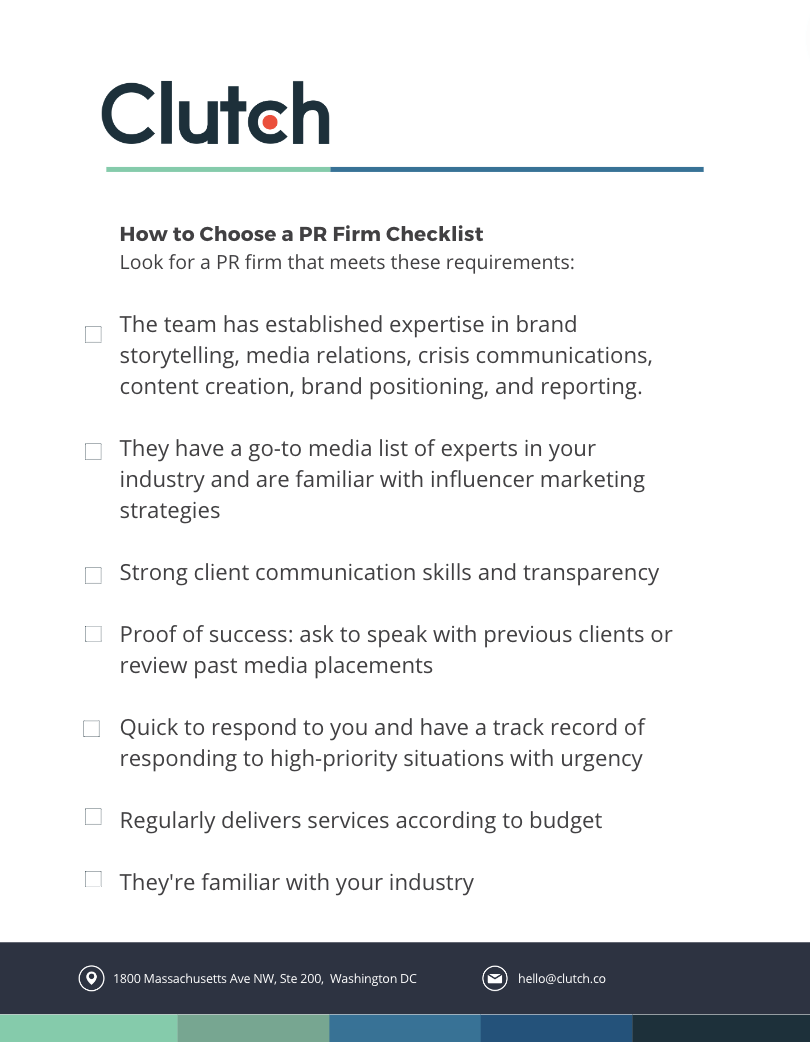

Updated February 23, 2026
Public relations is growing to be more and more of an indispensable part of company marketing strategies all over the world. Even so, strong PR efforts are taxing and need more in-house attention than a lot of businesses have available. To cope with this issue, it’s common for organizations to work with PR companies for improvements to brand image, reputation, and even rankings.
PR should be thought of as a central component of your business, not just your digital marketing strategy. This is because of its ability to bolster entire brands and dictate how the public perceives companies.
However, it’s much easier said than done, so most companies opt to find an agency. But just how do you find the right PR agency to achieve your PR goals?
Looking for a Public Relations agency?
Compare our list of top Public Relations companies near you
This guide is intended to help you identify strong PR companies, but more importantly, it will walk you step-by-step through the process of finding and deciding upon the perfect PR firm to hire.
Skip right to the good part. Find the right PR company for you on Clutch. Use the location, cost, and ratings filters to customize your search so you can connect with the right companies in minutes.
Because of the importance of the PR role at companies across industries, defining a ‘good agency’ requires considering a decent cross-section of positive attributes.
Of course, the desired qualities of agency partners will vary from client to client. Although, the following characteristics and competencies largely confirm that you’re speaking with a ‘legit’ PR firm.
Whether you’re a large corporation, small business, or a startup, PR shouldn’t fall to the back burner. Set-it-and-forget-it strategies are ineffective in shielding brands from crisis and scandal. Still, sometimes, companies don’t have the in-person resources to devote solely to public relations activities.
This is where finding the perfect PR company becomes not an option but a necessity. Follow these simple steps to ensure you make the right decisions throughout hiring and interviewing.
Laying out your goals clearly is the beginning step of every hiring process. If you don’t understand what you want from an external partner, the odds are slim that you can communicate your needs effectively with them. This makes for a confusing project.
Consider the nuances in what PR firms could provide and ask yourself whether or not you need these services. For instance, do you want to increase brand awareness, manage a crisis, define yourself as a thought leader, or do something else altogether?
With goals in hand, agencies can show up to conversations with relevant and helpful approaches to your problems. If you want tailored strategies specific to your company, think through these goal-setting methods:
PR services can drastically vary in cost depending on the scope and scale of your requirements. Knowing this, creating a budget at the beginning of the project can help you stick to what you can afford as you begin talking to providers and receiving quotes.
When you enter into your first conversations with potential agencies, you must be ready to bring your budget into the conversation. Being honest about what you can spend from the start will help companies work with you to prioritize your core needs without overspending on things you don’t need.
Learn how to set a PR budget by considering the cost of hiring a PR agency using Clutch’s PR Pricing Guide.
Now that you have a solid understanding of your goals and what you’re willing to spend on PR, you can start bringing agencies into the conversation.
Using tools like Clutch, you can filter and customize your searches for firms that specialize in your industry or align with your expectations for pricing. Parse through third-party reviews from past clients to get a feel for what it would be like to work with different firms.
Outside of Clutch, explore business websites for case studies, portfolio items, and other valuable insights into a firm's reputation.
Before reaching out to all the companies you’ve considered, aim to narrow your option down to a 3–5 company shortlist.
You don’t want to spend more time than necessary interviewing companies that aren’t right for you. It’s important to make sure you set manageable expectations for yourself and the hiring team by not overcommitting to interviewing too many candidates.
In choosing your select few, remember which firms had strong reputations, experience in your industry, and a demonstrated ability to achieve similar results.
You can rely on the research you collected to make these tough calls.
Now that you have a list of possible providers, contact them for interviews or consultations.
Once you've shortlisted a few promising PR agencies, it's time to conduct in-depth interviews.
After reviewing the proposals and conducting interviews, it's time to decide. At this point, you’ve gotten to know the teams a bit better and can make judgment calls based on softer qualities like team compatibility and brand values.
Particularly importantly, you should have a good feel for how well different firms understand your industry. For those needing industry experience, this should be a quick way to narrow down your shortlist.
In addition to industry, here are some game-changer areas that you may want to think through to make your last round of cuts:
Returning to these two essential focus areas will encourage you to think back to your goals and budget from the beginning of this effort. Once you see which company makes the most sense given your goals, you should be positioned to select your agency.
Once you've selected the right PR agency, it's time to move forward with a contract. A well-structured contract should include:
At this point, none of this should be a surprise because you’ve discussed all of this during the interviews. However, if something seems off or unaligned, bring it up before you sign. Open communication will save you time in the long run.
Need some extra support in tracking your success in finding a PR company? Download our checklist to make sure you’re choosing the right PR firm every step of the way.

Download this checklist before hiring a PR Agency.
Choosing the right PR company is instrumental in building a strong online and offline presence for your business. By following these steps, you can make an informed choice that aligns with your business objectives and helps you achieve PR success.
Connect with the best PR firms on Clutch.


